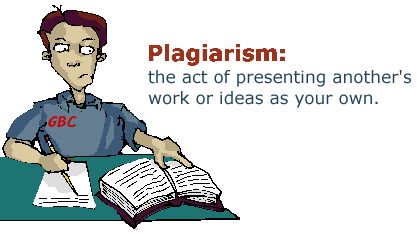
|
|
 |
Plagiarism:What's it all about? |
Plagiarism is a serious academic offense.
Plagiarism is a difficult concept to define. It can include a range of things from an innocent act of not using proper citation to a deliberate act of handing in work that someone else has written or produced. When students are asked to produce work for a course, they often must draw on the words, ideas or concepts of others. When others works are used, credit must be given to those authors by quoting or citing the sources.
Work includes a wide range of things from original ideas, strategies and research, to graphics, art, music, computer software, video or any form of creative expression. When we say work, we mean any words, visuals, or concepts. So, it is not just the written word that can be plagiarized. It can even be an abstract idea. Students could even be accused of self-plagiarism if they handed in a piece of work they had written for another course. What one may feel is only a phrase of three words may actually be a unique expression that must be documented. It's not the number of words that makes it plagiarism.
When we talk about the source of the work, we are talking about any published work or any unpublished work. Plagiarism can be the use of a famous author's work, but it can also be the use of the work of your roommate. And while the famous author may have a great facility for language and the roommate is a real layabout, it makes no difference-- it is equally bad!
But wait I didn't mean to do it! |
|
Deliberate or Accidental? |
Deliberate plagiarism is cheating. The minimal consequence for plagiarism at GBC is a grade of zero on the assignment. But if the assignment happens to make up a significant portion of the course, a student could be in jeopardy of failing the course. (Click here now for the exact George Brown Policy wording)
Deliberate plagiarism occurs when students knowingly submit work that is not their own. Some examples of deliberate plagiarism:
Accidental Plagiarism occurs when students mistakenly do not credit their sources. Some examples of accidental plagiarism:
If you look at the two above categories, it will become clear that there is a very grey area between deliberate and accidental plagiarism. So how can a teacher tell the difference? Well the truth is there are times when it is very difficult to tell. But the point is----it is all plagiarism and the penalty can be the same: a big Zero!
Continue on to find out How to Avoid Plagiarism......